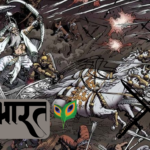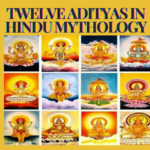The Sarpa Yajna, or Snake Sacrifice, is a legendary ritual performed by King Janamejaya, the son of King Parikshit, as a response to the death of his father. This event is detailed in the ancient Indian epic, the Mahabharata, specifically in the Astika Parva of the Adi Parva.
The Death of King Parikshit.
King Parikshit, the ruler of Hastinapura and a descendant of the Pandavas, met a tragic end after being cursed by a young sage named Sringin. The curse was a result of an incident where King Parikshit, tired and thirsty from a hunt, insulted Sringin’s father, Sage Shamika, by placing a dead snake around his neck. Despite Shamika’s calm demeanor, his son, Sringin, was enraged upon hearing of the insult and cursed King Parikshit to die within seven days, bitten by the king of serpents, Takshaka.
On the seventh day, as predicted, Takshaka, the powerful Naga (serpent king), bit Parikshit, and the venomous bite led to his immediate death.
Janamejaya’s Desire for Revenge.
Upon learning of his father’s untimely death and the curse that led to it, Janamejaya, the son of Parikshit, was filled with grief and rage. Driven by a desire for vengeance against the entire race of Nagas, Janamejaya decided to perform a grand ritual called the Sarpa Yajna or Snake Sacrifice. The purpose of this yajna (sacrifice) was to invoke powerful mantras and incantations that would cause all snakes in the world, including Takshaka, to fall into the sacrificial fire.
The Sarpa Yajna Begins.
Under the guidance of his priests and advisors, Janamejaya commenced the Sarpa Yajna. The priests chanted powerful Vedic hymns, invoking the fire god Agni, and performed the sacrificial rites with the intent of drawing all the snakes into the fire. The mantras were so potent that snakes of all kinds began to fall into the sacrificial fire from all corners of the earth. The sky was filled with the cries of the serpents as they were drawn inexorably towards the sacrificial altar.
The Intervention of Sage Astika.
As the sacrifice continued, many serpents perished, and it seemed that none would be spared, including Takshaka, the serpent who had killed King Parikshit. Fearing the complete annihilation of their race, the Nagas sought refuge and assistance from the sage Astika.
Astika was a young, wise sage born to a Naga mother, Manasa, and a Brahmin father, Jaratkaru. Seeing the impending doom of his mother’s race, Astika decided to intervene and put an end to the sacrifice. With his profound knowledge and eloquence, Astika arrived at the sacrificial site and began to praise Janamejaya and his ancestors. His words were so pleasing and full of wisdom that Janamejaya, intrigued by the young sage’s intellect and charisma, granted him a boon.
Astika’s Request.
Astika then made his request known: he asked Janamejaya to stop the Sarpa Yajna and spare the remaining serpents, including Takshaka. Initially reluctant, Janamejaya was persuaded by the sage’s reasoning and his commitment to dharma. Moreover, the Brahmins performing the sacrifice also advised Janamejaya to honor his word and grant the sage his request. Realizing the righteousness in Astika’s plea, Janamejaya finally agreed to halt the sacrifice.
The End of the Yajna.
With the cessation of the Sarpa Yajna, the remaining serpents were saved, and peace was restored. The sages and priests blessed Janamejaya for his decision, and Astika, in turn, blessed him with a long life and prosperity for his kingdom. Thus, the curse on the Nagas was lifted, and Takshaka was spared from being drawn into the sacrificial fire.
Significance of the Sarpa Yajna.
The story of the Sarpa Yajna is significant in Hindu mythology for several reasons:
- Dharma and Forgiveness: It demonstrates the importance of forgiveness and the adherence to one’s word, even in the face of anger and grief.
- Interconnectedness of All Beings: The intervention by Astika highlights the interconnectedness of all beings, human and non-human, and the need to respect all forms of life.
- Power of Righteousness: The event showcases that true power lies in righteousness and wisdom, rather than brute force or vengeance.
The Sarpa Yajna of Janamejaya is a powerful tale that underlines the balance between justice and compassion, a central theme in the Mahabharata.
Disclaimer : While Writing this post have taken some content reference from different blog posts around the web. If you think I have directly copy paste your content ,please contact me . I assure you that I will remove the content within 24 hours.





